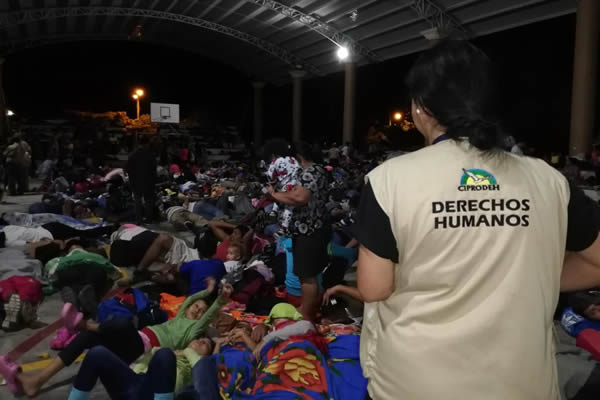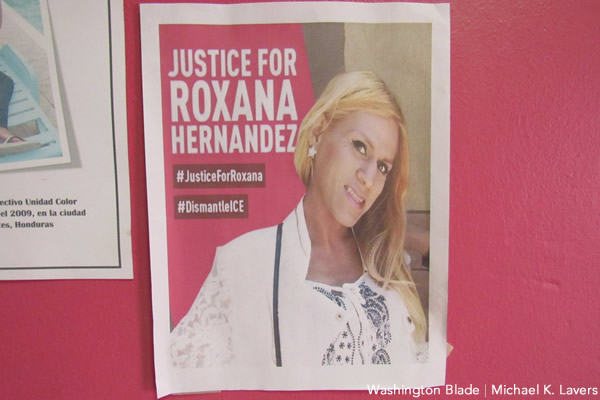News
Nueva caravana de migrantes sale de Centroamérica
Grupo que viaja hacia EEUU tiene personas LGBTI


Una caravana de más de 4.000 personas salió de San Pedro Sula, Honduras, el 14 de octubre de 2018. Activistas en Honduras han dicho al Washington Blade que algunos de los migrantes en la caravana son miembros de la comunidad LGBTI.
Reportes indican que la caravana de migrantes que salió de la ciudad hondureña de San Pedro Sula llegó a la frontera entre Guatemala y México el 19 de octubre.
Activistas en San Pedro Sula y la capital hondureña de Tegucigalpa dijeron al Washington Blade la semana pasada que hay más de 4.000 migrantes en la caravana. Los activistas también dijeron que algunos de los migrantes son LGBTI.
Los intentos del Blade de hablar con migrantes LGBTI en la caravana hasta ahora han resultado infructuosos.
El presidente Trump ha amenazado con cortar la ayuda estadounidense a Honduras, Guatemala y El Salvador si sus gobiernos no pararan a los migrantes de salir de sus países.
“Hoy hemos informado a los países de Honduras, Guatemala y El Salvador que si permiten a sus ciudadanos, o otros, viajen a través de sus fronteras y hasta los Estados Unidos, todos los pagos hechos a ellos PARARÁN (TERMINARÁN),” el proclamó el 16 de octubre en un tweet.
We have today informed the countries of Honduras, Guatemala and El Salvador that if they allow their citizens, or others, to journey through their borders and up to the United States, with the intention of entering our country illegally, all payments made to them will STOP (END)!
— Donald J. Trump (@realDonaldTrump) October 17, 2018
Trump el 18 de octubre dijo que “llamaría el ejército estadounidense y cerraría nuestra frontera sur” si el gobierno mexicano no “detuviera este ataque.” También describió a los migrantes como “un gran flujo de personas, incluidos muchos criminales.”
El gobierno mexicano ha empezado de procesar a los migrantes que han entrado el país desde Guatemala. El secretario de Estado de los EEUU Mike Pompeo el 18 de octubre en un comunicado dijo que los EEUU agradece el anuncio del gobierno mexicano que trabajará con el Alto Comisionado para los Refugiados de la ONU “para abordar los problemas de inmigración en la región, incluida la afluencia de personas que llegan a México.”
Pompeo el 19 de octubre habló más sobre los migrantes durante una conferencia de prensa con su homólogo mexicano, Luis Videgaray, en la Ciudad de México.
“El desafío relacionado con asegurar nuestra frontera sur también es un desafío para la soberanía estadounidense,” dijo Pompeo. “Tenemos que arreglar las leyes de los EEUU para poder manejar esto correctamente también. Esa es una carga estadounidense, una carga exclusivamente estadounidense y como dijo el presidente Trump, es algo que debemos abordar dentro de nuestro país para asegurarnos de que lo hagamos bien. Si lo hacemos bien, también mejoraremos la relación material entre nuestros dos países.”
Pompeo más tarde dijo a los reporteros antes de salir de la Ciudad de México que el saliente presidente mexicano Enrique Peña Nieto desplegó 500 policías federales a la frontera de su país con Guatemala. Pompeo también notó que cuatro de ellos resultaron heridos el 19 de octubre durante los enfrentamientos con migrantes que intentaban entrar a México.
“Entendemos que para ser precisos,” dijo Pompeo. “No sabemos la gravedad de esas lesiones, pero quiero expresar mi simpatía a esos cuatro policías. Eso es evidencia de lo que realmente es. Este es un grupo, un gran grupo de personas; están colocando a mujeres y niños frente a la caravana para usarlos como escudos mientras se abren paso. Este es un esfuerzo organizado para superar y violar la soberanía de México, por lo que estamos preparados para hacer todo lo que podamos para apoyar las decisiones que México tome sobre cómo abordarán este tema tan serio e importante para su país.”
Caravana se convierte en tema de las elecciones ‘midterm’
La caravana salió de Honduras menos de un mes antes de las elecciones “midterm” de los EEUU.
El presidente hondureño Juan Orlando Hernández y el vicepresidente salvadoreño Óscar Ortiz el 11 de octubre reiteraron las preocupaciones de sus gobiernos sobre la separación de los niños de sus padres migrantes bajo la política migratoria “tolerancia cero” de Trump cuando hablaron durante una conferencia al Departamento de Estado que se enfocó en la prosperidad y la seguridad en Centroamérica. El vicepresidente Trump, que habló a la conferencia con Pompeo, de nuevo instó a los países en el Triángulo Norte — Honduras, Guatemala y El Salvador — para frenar el flujo de migrantes.
“Los líderes en esta sala, los gobiernos que representan, deben decirle a su gente que no ponga a sus familiares en riesgo al tomar el peligroso viaje al norte para intentar entrar los Estados Unidos ilegalmente,” dijo Pence. “La verdad es que tu mensaje probablemente se puede resumir diciéndoles que si no pueden venir legalmente a los Estados Unidos legalmente, no deberían hacerlo. Dígalo con fuerza y dígalo con compasión como vecinos y como amigos porque es la verdad.”
El gobierno hondureño en un comunicado que emitió el 16 de octubre dijo la caravana “fue organizada por sectores políticos con falsas promesas de otorgar visa humanitaria para transitar por territorio mexicano y acogerse a una figura de asilo en los Estados Unidos.”
Activistas in Honduras durante el pasado año han dicho al Blade que el gobierno hondureño no ha hecho lo suficiente para combatir la violencia, la discriminación y la falta de oportunidades económicas que han dicho provocan a miembros de la comunidad LGBTI de salir del país. Los activistas también notaron que más de 30 personas murieron en manifestaciones violentas que se realizaron por Honduras el pasado noviembre después de la reelección cuestionada de Hernández.
El gobierno hondureño en su comunicado insta a los migrantes a “no poner en riesgo su vida ni la de sus hijos en una ruta de dolor y muerte, dominada por condiciones adversas como hambre, calor extremo, frío, fatiga, enfermedades y expuestos a ser víctimas de traficantes de personas, órganos, redes criminales, de prostitución y narcotráfico.” El gobierno hondureño también dijo que “continuamos brindando la asistencia (a migrantes) para retornar a sus comunidades.”
Mas de 10.000 salvadoreños ahora viven en Washington.
La alcaldesa de Washington Muriel Bowser en enero criticó a la administración de Trump para terminar el Estatus de Protección Temporal (TPS en inglés) que ha permitido casi 200.000 salvadoreños de recibir permisos de residencia que les han permitido permanecer en los EEUU. Bowser en agosto viajó a El Salvador y reiteró que su administración continuará ayudar a los migrantes en Washington.

Una activista de derechos humanos está con un grupo de migrantes que salieron de San Pedro Sula, Honduras, el 14 de octubre de 2018.
Mujer trans que murió bajo custodia EEUU era parte de otra caravana
Los migrantes que salieron de San Pedro Sula el 14 de octubre son parte de la última caravana de la región.
Roxana Hernández, una mujer trans con VIH que fue detenida por la Oficina de Aduanas y Protección Fronteriza (CBP en inglés) de Estados Unidos el 9 de mayo cuando pidió asilo al puerto de entrada de San Ysidro cerca de San Diego, era parte de una caravana de 300 personas que viajó a la frontera estadounidense. Hernández murió en un hospital en Nuevo México unas semanas después cuando ella estaba bajo la custodia de la Oficina de Inmigración y Aduanas de Estados Unidos (ICE en inglés).
Un grupo de 16 migrantes trans y gay de Nicaragua, Honduras, El Salvador, Guatemala y México que se llamaban la Primera Caravana Trans Gay Migrante pidió asilo en Nogales, Arizona, el 10 de agosto de 2017.
Violencia contra la comunidad LGBTI sigue siendo común en el Triángulo Norte. La discriminación basada en la orientación sexual y la identidad de género, la pobreza y una falta de acceso a educación y cuidado de la salid están entre la miríada temas que se enfrenta la comunidad LGBTI de la región.
Salvadoreños, hondureños y guatemaltecos LGBTI están entre la más de 225.000 migrantes que han tratado de ingresar a los EEUU durante el pasado año, aunque activistas en los tres países han dicho al Blade la política migratoria de la administración Trump sigue provocar el miedo por el Triángulo Norte.
La actual política migratoria estadounidense también ha impulsado a los migrantes LGBTI de Centroamérica de quedarse en México y pedir asilo allá.

Una foto de Roxana Hernández, una mujer trans que murió bajo la custodia de la Oficina de Inmigración y Aduanas de Estados Unidos (ICE en inglés) en mayo de 2018, está en Colectivo Unidad Color Rosa, un grupo LGBTI en San Pedro Sula, Honduras. (Foto de Washington Blade por Michael K. Lavers)

Texas state Rep. James Talarico won a hard-fought primary Tuesday to become the state’s Democratic nominee for U.S. Senate, defeating U.S. Rep. Jasmine Crockett in one of the year’s most closely watched and competitive Democratic contests.
Talarico, a Presbyterian seminarian and three-term lawmaker from Round Rock, was declared the winner by the Associated Press early Wednesday morning after a closely tracked vote count that drew national attention.
“Tonight, the people of our state gave this country a little bit of hope,” Talarico told the AP. “And a little bit of hope is a dangerous thing.”
With 52.8% of the vote to Crockett’s 45.9%, Talarico secured the nomination outright, avoiding a runoff and capping months of sharp contrasts between the two candidates over strategy, messaging, and how best to compete statewide in Texas. Democrats hope the competitive primary — and the relatively narrow margin — signals growing momentum in a state that has not elected a Democrat to the U.S. Senate since 1988.
Talarico has long expressed support for the LGBTQ community, a position he highlights prominently on his campaign website. Under the “Issues” section, he directly addresses assumptions that might arise from his faith and background as a seminarian in a deeply conservative state.
“My faith in Jesus leads me to reject Christian Nationalism and commit myself to the project of democracy,” his website reads. “Because that’s the promise of America: a democracy where every person and every family — regardless of religion, race, gender, sexual orientation, or any other difference between us — can truly be free and live up to their full potential.”
Crockett struck a conciliatory tone following her defeat, emphasizing party unity ahead of November.
“This morning I called James and congratulated him on becoming the Senate nominee,” Crockett told Politico. “Texas is primed to turn blue and we must remain united because this is bigger than any one person. This is about the future of all 30 million Texans and getting America back on track.”
Talarico also drew national attention earlier in the race when “Late Show” host Stephen Colbert said he was initially unable to air an interview with the state legislator due to potential FCC concerns involving CBS. The episode sparked a broader political debate.
Brendan Carr, chair of the Federal Communications Commission, appointed by President Donald Trump, told reporters the controversy was a “hoax,” though he also acknowledged Talarico’s ability to harness the moment to build support as an underdog candidate. The interview was later released online and garnered millions of views, boosting Talarico’s national profile.
In November, Talarico will face the winner of the Republican primary between incumbent Sen. John Cornyn and Texas Attorney General Ken Paxton, who have been locked in a bruising GOP contest. Rep. Wesley Hunt was also in the Republican primary field. The GOP race is expected to head to a May runoff.
In a joint statement, Senate Minority Leader Chuck Schumer and Democratic Senatorial Campaign Committee Chair Kirsten Gillibrand praised Talarico’s victory and framed him as a candidate capable of broad appeal.
“As an eighth-generation Texan, former middle school teacher, and Presbyterian seminarian, James will be a fighter for Texans from all walks of life and of all political stripes,” they said. “In November, Texans will elect a champion for working people: James Talarico.”
Maryland
Md. Commission on LGBTQIA+ Affairs released updated student recommendations
LGBTQ students report higher rates of bullying, suicide

The Maryland Commission on LGBTQIA+ Affairs has released updated recommendations on how the state’s schools can support LGBTQ students.
The updated 16-page document outlines eight “actionable recommendations” for Maryland schools, supplemented with data and links to additional resources. The recommendations are:
- Developing and passing a uniform statewide and comprehensive policy aimed at protecting “transgender, nonbinary, and gender expansive students” against discrimination. The recommendation lists minimum requirements for the policy to address: name, pronoun usage, and restroom access.
- Requiring all educators to receive training about the specific needs of LGBTQ students, by trained facilitators. The training’s “core competencies” include instruction on terminology, data, and support for students.
- Implementing LGBTQ-inclusive curricula and preventing book bans. The report highlights a “comprehensive sexual education curriculum” as specifically important in the overall education curriculum. It also states the curriculum will “provide all students with life-saving information about how to protect themselves and others in sexual and romantic situations.”
- Establishing Gender Sexuality Alliances “at all schools and in all grade levels.” This recommendation includes measures on how to adequately establish effective GSAs, such as campaign advertising, and official state resources that outline how to establish and maintain a GSA.
- Providing resources to students’ family members and supporters. This recommendation proposes partnering with local education agencies to provide “culturally responsive, LGBTQIA+ affirming family engagement initiatives.”
- Collecting statewide data on LGBTQ youth. The data on Maryland’s LGBTQ youth population is sparse and non-exhaustive, and this recommendation seeks to collect information to inform policy and programming across the state for LGBTQ youth.
- Hiring a full-time team at the Maryland Department of Education that focuses on LGBTQ student achievement. These employees would have specific duties that include “advising on local and state, and federal policy” as well as developing the LGBTQ curriculum, and organizing the data and family resources.
- Promoting and ensuring awareness of the 2024 guidelines to support LGBTQ students.
The commission has 21 members, with elections every year, and open volunteer positions. It was created in 2021 and amended in 2023 to add more members.
The Governor’s Office of Communication says the commission’s goal is “to serve LGBTQIA+ Marylanders by galvanizing community voices, researching and addressing challenges, and advocating for policies to advance equity and inclusion.”
The commission is tasked with coming up with yearly recommendations. This year’s aim “to ensure that every child can learn in a safe, inclusive, and supportive environment.”
The Human Rights Campaign’s most recent report on LGBTQ youth revealed that 46.1 percent of LGBTQ youth felt unsafe in some school settings. Those numbers are higher for transgender students, with 54.9 percent of them saying they feel unsafe in school.
Maryland’s High School Youth Risk Behavior Survey reveals a disparity in mental health issues and concerns among students who identify as LGBTQ, compared to those who are heterosexual. LGBTQ students report higher rates of bullying, feelings of hopelessness, and suicidal thoughts. Nearly 36 percent of LGBTQ students report they have a suicide plan, and 26.7 percent of respondents say they have attempted to die by suicide.
The commission’s recommendations seek to combat the mental health crisis among the state’s LGBTQ students. They are also a call for local and state governments to work towards implementing them.
Virginia
Va. lawmakers consider partial restoration of Ryan White funds
State Department of Health in 2025 cut $20 million from Part B program

The Virginia General Assembly is considering the partial restoration of HIV funding that the state’s Department of Health cut last year.
The Department of Health in 2025 cut $20 million — or 67 percent of total funding — from the Ryan White Part B program.
The funding cuts started with the Trump-Vance administration passing budget cuts to federal HIV screening and protection programs. Rebate issues between the Virginia Department of Health and the company that provides HIV medications began.
Advocates say the funding cuts have disproportionately impacted lower-income people.
The Ryan White HIV/AIDS Program, a federal program started in 1990, provides medical services, public education, and essential services. Part B offers 21 services, seven of which remained funded after the budget cuts.
Equality Virginia notes “in 2025, a 67 percent reduction severely destabilized HIV services across the commonwealth.”
Virginia lawmakers have approved two bills — House Bill 30 and Senate Bill 30 — that would partially restore the funding. The Ryan White cuts remain a concern among community members.
Both chambers of the General Assembly must review their proposed changes before lawmakers can adopt the bills.
“While these amendments aren’t a full restoration of what community-based organizations lost, this marks a critical step toward stabilizing care for thousands of Virginians living with HIV,” said Equality Virginia Executive Director Narissa Rahaman. “Equality Virginia plans to continue their contact with lawmakers and delegates through the conference and up until the passing of the budget.”
“We appreciate lawmakers from both sides of the aisle who recognized the urgency of this moment and will work to ensure funding remains in the final version signed by the governor,” added Rahaman.


















